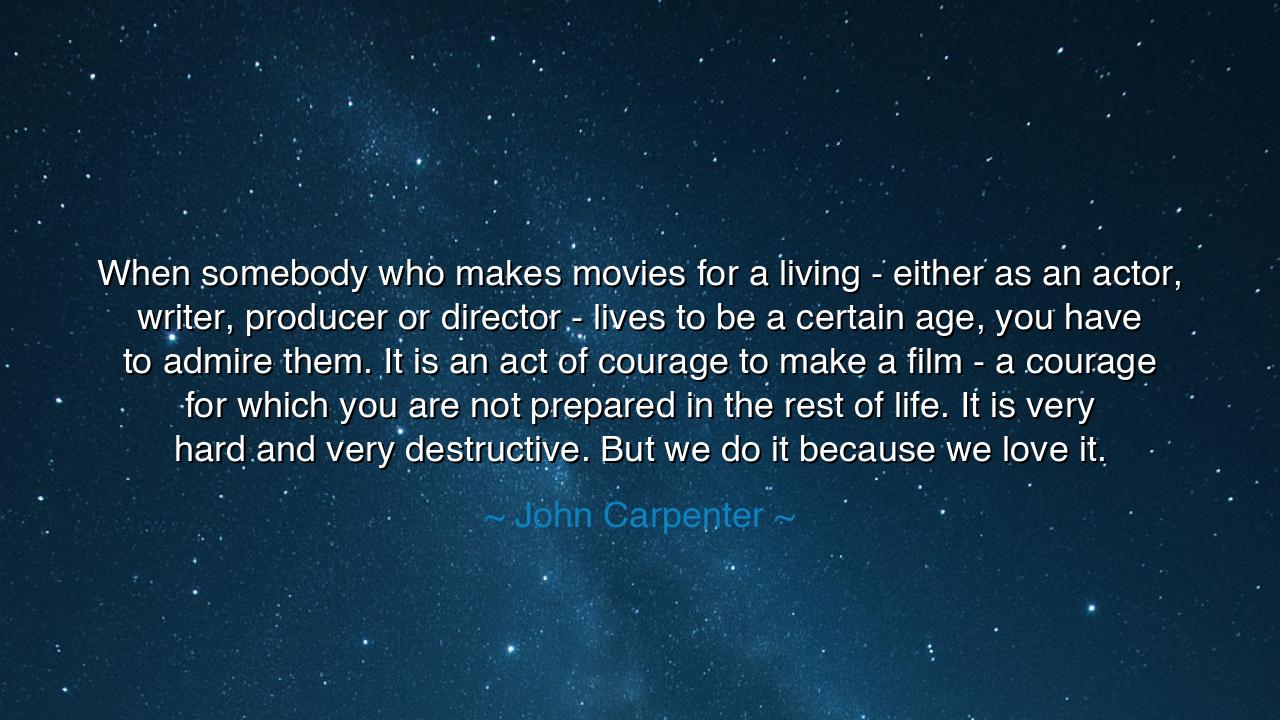
When somebody who makes movies for a living - either as an actor
When somebody who makes movies for a living - either as an actor, writer, producer or director - lives to be a certain age, you have to admire them. It is an act of courage to make a film - a courage for which you are not prepared in the rest of life. It is very hard and very destructive. But we do it because we love it.






In the twilight realm between art and endurance, John Carpenter spoke words that resound with both reverence and weariness: “When somebody who makes movies for a living—either as an actor, writer, producer or director—lives to be a certain age, you have to admire them. It is an act of courage to make a film—a courage for which you are not prepared in the rest of life. It is very hard and very destructive. But we do it because we love it.” These are not the boasts of a triumphant man, but the confessions of a creator who has wrestled with the gods of imagination and lived to tell the tale. In these words lies the sacred struggle of the artist—the eternal tension between creation and destruction, between love and suffering, between courage and exhaustion.
For what Carpenter calls an act of courage is the very essence of artistic creation. To make a film, to summon life out of shadow and silence, is to wage war against uncertainty, against failure, and often against one’s own despair. The artist must carve form out of chaos, vision out of limitation. Every story told, every frame captured, is a fragment of the soul, torn free and offered to the world. This is why Carpenter, a master of cinematic fear and human fragility, speaks of filmmaking as something destructive—for in creating, the artist gives of themselves until they are hollowed, exhausted, changed.
And yet, what compels one to endure such pain? It is love—the boundless, consuming love for the craft itself. Love that disregards comfort, that defies logic. Love that, even after heartbreak and ruin, whispers still: “Do it again.” Carpenter’s words carry the weight of those who have lived decades in this furnace of creation, where praise fades and critics wound, but the fire remains. His acknowledgment that surviving such a life deserves admiration reveals the truth: art is not only a calling but a trial, and those who persist are the quiet heroes of imagination.
History remembers many such souls who bore the same torch. Consider Akira Kurosawa, the great Japanese director, who, after creating films of incomparable vision, faced years of rejection and despair. When studios turned away and success seemed lost, he attempted to end his life—yet even that darkness could not claim his spirit. He returned, wounded but undeterred, to make Kagemusha and Ran, works of breathtaking power and wisdom. Like Carpenter, Kurosawa understood that the act of filmmaking was both beautiful and brutal, both a gift and a wound. His courage was not in his fame, but in his refusal to let defeat extinguish his art.
To create is to confront oneself. The artist must lay bare their fears, their desires, their failures. Few other callings demand such surrender. The carpenter builds with wood and iron; the filmmaker builds with emotion and memory, with faces and moments that will outlive their maker. Every film becomes a reflection of one’s inner landscape, and every criticism a blade turned inward. It is little wonder that Carpenter calls it destructive—for art consumes the one who makes it. Yet, paradoxically, it is in that destruction that something eternal is born.
Carpenter’s words also speak to the deeper truth of human perseverance. Every person, not only artists, must face their own “films”—their endeavors that demand all their strength and spirit. Whether it be raising a child, building a business, healing a wound, or defending a dream, life itself asks for courage. It asks that we act even when uncertain, that we create even when weary. The artist’s struggle mirrors the struggle of every soul who dares to love something enough to risk being broken by it.
Let this then be the teaching: pursue your work not because it is easy, but because it is sacred. Do not fear the hardship that accompanies passion, for it is proof that your endeavor matters. If your heart trembles, let it tremble; if your spirit falters, let it rest—but never let it die. For in the end, what Carpenter reveals is this: we do it because we love it, and love—real, burning, relentless love—is the one force strong enough to transform pain into art, failure into wisdom, and time into legacy.
So, to those who labor in the arts, or in any pursuit that demands the whole of the heart—take courage. Let your exhaustion be your badge, your resilience your song. For to create, to build, to keep reaching despite the weight of the world, is the most human act of all. And when the day comes that your strength wanes, may the world look upon you and say, as Carpenter said of his own kind: you have lived bravely, and your life—though hard and scarred—was a work of love.






AAdministratorAdministrator
Welcome, honored guests. Please leave a comment, we will respond soon